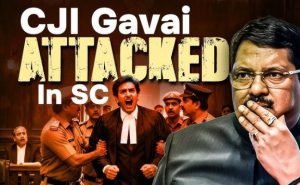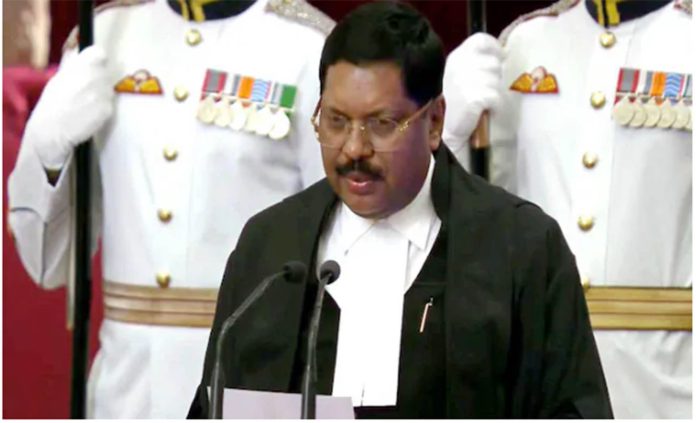Hate erupts inside India’s Supreme Court as a senior lawyer attacks Chief Justice B.R. Gavai, exposing deep social and ideological fissures. A disturbing reflection of growing intolerance challenging India’s constitutional spirit.
By Dr. Mohammad Farooque | Qalam Times News Network
Kolkata | October 6, 2025
A Day When Hate Entered the Supreme Court
Hate took an unthinkable form inside India’s Supreme Court on the afternoon of October 6, 2025, when an incident shattered the sanctity of the nation’s highest judicial institution. Chief Justice B.R. Gavai was presiding over routine hearings in the grand central hall when Rakesh Kishore, a senior advocate registered with the Delhi Bar Council, suddenly approached the bench, removed his shoe, and attempted to hurl it toward the Chief Justice. The court’s security staff acted with promptness and restrained the lawyer before he could cause any harm, escorting him out of the courtroom.
As the chaos erupted, the lawyer screamed a slogan declaring that he would not tolerate any insult to Sanatan Dharma, turning what could have been dismissed as a lone act of frustration into a display of organized hate driven by ideological outrage. Despite the uproar, Chief Justice Gavai urged calm, demonstrated remarkable composure, and allowed court proceedings to continue without disruption.

A Symbol of Rising Intolerance
This was not merely an act of courtroom misconduct—it symbolized a deeper and disturbing pattern of rising hate and social polarization. Justice Gavai, India’s second Dalit Chief Justice and a follower of Buddhism, has often represented the ideals of inclusive justice. The attacker’s actions and slogan underscored how religious majoritarianism and caste bias are fracturing the moral foundations of India’s democracy, where sacred traditions now appear to outweigh the dignity of the judiciary.
The provocation reportedly stemmed from the Supreme Court’s recent rejection (on September 16) of a petition concerning the reinstallation of a seven-foot idol of Lord Vishnu at Khajuraho’s Juwari Temple. During that hearing, Chief Justice Gavai had remarked that such matters could not be treated as Public Interest Litigation and that the petitioners should “consult the deity themselves.” The remark was later misinterpreted by right-wing circles as blasphemous, sparking social media outrage linking the Chief Justice’s Buddhist faith to the issue. Many questioned whether such aggression would have occurred had he belonged to an upper-caste Hindu background.
Institutional Reaction and Media Bias
The Bar Council of India acted swiftly, suspending Rakesh Kishore from all legal and court-related activities. Chairman Manan Kumar Mishra labelled the act as a grave violation of judicial decorum, the Advocates Act, and professional ethics. The Delhi Bar Council was directed to enforce the suspension and initiate further disciplinary proceedings. Despite this, Delhi Police released Kishore after brief questioning, citing procedural limitations—a move that raised further eyebrows.
Worse still, sections of the mainstream media sensationalized the event instead of condemning it, framing the attacker as a defender of faith rather than a violator of justice. The contrast was glaring: the same media that remains silent when Dalits and minorities are attacked in places like Uttar Pradesh, Odisha, or Bareilly had now found its voice to glorify an act of hate against a Dalit Chief Justice.
According to National Crime Records Bureau data, 2023 witnessed no significant decline in crimes against Dalits. In several states, violence actually escalated. Caste-related murders and communal incidents in regions such as Bareilly and Odisha drew little coverage, thereby normalizing the everyday injustice now threatening India’s constitutional ethos.
Political and Moral Reckoning
Political leaders, including Congress figures Rahul Gandhi and Mallikarjun Kharge, condemned the assault and the growing culture of hate. In a joint statement, they denounced the government’s silence and the media’s prejudice, asserting that fear and fanaticism were replacing the spirit of justice and equality. They argued that India now stands at a crossroads: between the rule of law and the rule of hate.
What happened in the court, they warned, was not merely an attack on a man or an institution—it was an attack on the collective conscience of the republic. Chief Justice Gavai may have faced the shoe, but the real target was India’s constitutional soul. The nation must now decide whether it will continue lighting the lamp of justice or allow the winds of hate and bigotry to extinguish it.







